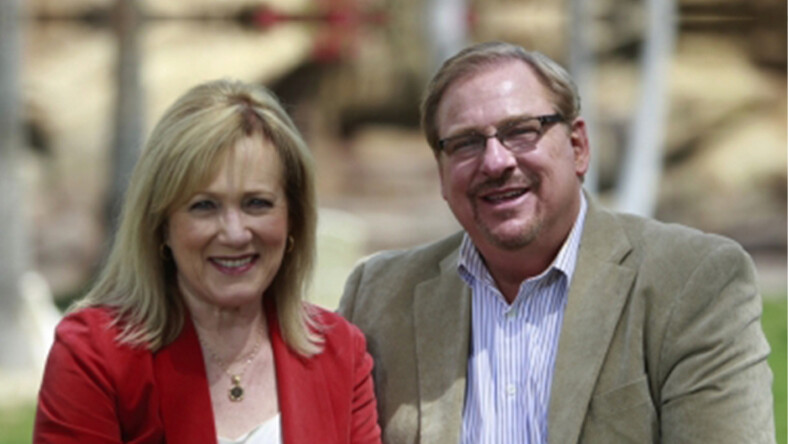On the first day of the HTB Leadership Conference in London, US mega pastor Rick Warren and his wife Kay - who together lead Saddleback church in Orange County, California - gave a candid interview in which they discussed their journey through grief and forgiveness in the past year.
Five days after Easter 2013, after a life-long battle with mental illness, their 27-year-old-son Matthew took his own life. It's a day the Warren's have openly described as the worst of their lives.
Rick opened the talk in the Royal Albert Hall by expressing his thanks for the support and response they have received from the Christian community.
"I wish we were as united in everything - in world mission - as we are in grief," he noted.
The couple went on to discuss the devastating effect that Matthew's death has had on their family.
"Mental illness is a thief and a robber, it causes conflict in families," Kay shared.
"When Matthew was alive we were worried that should he take his own life, then it would tear our marriage apart. We knew we wouldn't divorce, but we thought it would ruin our marriage.
"But we made the decision that though we may grieve differently, we would grieve together and show grace to one another."
Rick added: "The track record for married couples who have lost a child is not good. But we were determined not to become a statistic."
Despite their very public Christian profile, the Warrens have nonetheless been open about their struggle to reconcile their faith and belief in a loving God with the tragedy their family has suffered.
"I felt so alone," Kay admitted. "I lay awake at night filled with anxiety, grief, pain and agony. I was like 'Where is God? Where does my faith fit into this'?"
It was these questions that led Kay to share her struggle on social media, some of her posts have been shared millions of times by people all over the world who identify with her journey as a mother grieving the loss of her son.
"It's been a very difficult process; I've been told to 'move on' by people. But we need to take 'at least' out of our vocabulary. 'At least you can have more children; at least you can remarry, at least you can get another job...' 'At least' minimizes a person's pain. It's taking someone's grief and putting it in a box so we can manage it."
But God is not helpless among the ruins; he continues to work out his plan in love. Where there is ruining in your life, God rebuilds.
Kay Warren
"We don't do grief well, perhaps particularly as Christians. But we need to be aware of it, and learn to deal compassionately with it."
The key to this, Rick said, is to recognize grief as a valid and good thing. "It's a gift; it's how we get through trials," he asserted.
"We want to stuff our feelings down, but there is no growth without change, no change without loss, no loss without pain and no pain without grief.
"God grieves; we are made in his image, that's how we are able to grieve too. Jesus wept."
Kay then discussed the importance of learning from those who struggle with mental illness. "We can learn from Christians with depression," she said.
"They are among the most courageous people. While we may go through times where we are in the valley, we expect to come out on the other side and climb the mountain. Some people live in the valley.
"They can teach us something valuable; to keep going when the darkness doesn't lift or recede. The Church needs to recognize the value of what those struggling with mental illness bring."
The overriding encouragement was for the Church to embrace hope in the midst of suffering, and to be a place of inclusivity, forgiveness and rest.
"We must hold on to hope," Rick declared. "Those in leadership are specifically targeted by Satan. Behind every public success is private pain - it's the cost of anointing, and the cost of blessing."
He went on to highlight three reasons to forgive - that we are already forgiven by God, that resentment breeds misery, and we will all need forgiveness in the future.
Kay added that a particular verse of encouragement for her has been 1 Corinthians 15:3, which says we are buried in weakness, but will be raised in strength.
"Following Matthew's death I felt like I was sitting on the edge of Hell. Romans 5 tells us that his hope does not disappoint us, well, I wasn't disappointed, I was crushed. It felt like my life had been reduced to ashes," she said.
"But God is not helpless among the ruins; he continues to work out his plan in love. Where there is ruining in your life, God rebuilds."
Rick finished the session with a call for those struggling with issues surrounding mental health to know that God is working in them and through them, and we can look forward to the restoration of all creation in heaven.
"To those who are struggling with mental illness - it's not a sin to be sick. Your illness is not your identity. Your chemistry is not your character," he asserted.
"Everything in our world is broken - the economy, the weather, marriage, our bodies... We hold this treasure in jars of clay, but we're all a little cracked."
"But no eye has seen, no ear has heard and no mind has conceived the things God has prepared for those who love him."
